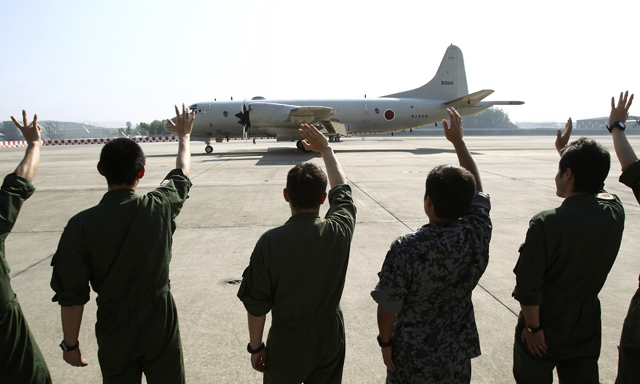PERTH, Australia — The sighting of a wooden pallet and other debris that may be linked to a Malaysian passenger jet raised hopes Sunday of a breakthrough in the international search for the missing plane.
The sense that the hunt was finally on the right track after more than two weeks of false leads and dead ends was reinforced by new French satellite data indicating floating objects in the southern search area.
Australian officials said the pallet, along with belts or straps, was spotted Saturday in a remote stretch of the Indian Ocean that has become the focus of the search — around 2,500 kilometres southwest of Perth.
“It’s still too early to be definite,” Australian Prime Minister Tony Abbott told reporters during a visit to Papua New Guinea.
“But obviously we have now had a number of very credible leads and there is increasing hope — no more than hope, no more than hope — that we might be on the road to discovering what did happen to this ill-fated aircraft.”
Australian and Chinese satellite images have picked up large objects floating in the inhospitable region, and Malaysia’s transport ministry said Sunday that France had provided similar data “in the vicinity of the southern corridor”.
The Malaysian statement gave no details of the French satellite data.
But France’s foreign ministry said it came in the form of satellite-generated radar echoes, which contains information about the location and distance of the object which bounces a signal back.
The Australian Maritime Safety Authority (AMSA) confirmed that the pallet and other debris marked the “first visual sighting” since Australian, New Zealand and US spotter planes began scouring the area on Thursday.
Wooden pallets are quite common in aircraft and ship cargo holds.
The objects were spotted by observers on one of the civilian aircraft taking part in the search.
An air force P3 Orion aircraft with specialist electro-optic observation equipment was diverted to the same location, but only reported sighting clumps of seaweed.
“That’s the nature of it,” AMSA aircraft operations coordinator Mike Barton said.
“You only have to be off by a few hundred metres in a fast-travelling aircraft.”
Sunday’s search involving four military and four civilian aircraft plus an Australian warship ended with “no sightings of significance” but would resume Monday, AMSA said.
Sunday’s search covered 59,000 square kilometres.
More ships, planes
China has dispatched seven ships to the hunt for the plane, adding to British and Australian naval ships involved.
“Obviously the more aircraft we have, the more ships we have, the more confident we are of recovering whatever material is down there,” Abbott said.
AMSA said Chinese and Japanese planes would join Monday’s operation.
If the plane did crash in the ocean, investigators are hoping to identify the impact site before the plane’s black box stops emitting tracking signals — usually after 30 days.
The flight recorder will be crucial in solving the mystery of what caused the Boeing 777 with 239 passengers and crew aboard suddenly to veer off course over the South China Sea en route to Beijing.
Satellite and military radar data suggest the plane backtracked over the Malaysian peninsula and then flew on — possibly for hours — either north into South and Central Asia, or south over the Indian Ocean.
The question of what happened on board has become a topic of unbridled speculation, with Malaysian investigators standing by their assessment that the plane was deliberately diverted by someone on board.
Three scenarios have gained particular traction: hijacking, pilot sabotage, or a sudden mid-air crisis that incapacitated the flight crew and left the plane to fly on auto-pilot for several hours until it ran out of fuel and crashed.
A ‘humanitarian’ exercise
The long, largely fruitless search for the aircraft has been especially agonising for the relatives of the 227 passengers — two-thirds of whom were Chinese — and 12 crew.
Their grief and frustration boiled over Saturday at a hotel in Beijing when police had to restrain angry family members confronting Malaysian officials whom they accused of withholding information.
After a similar meeting on Sunday, some relatives said they were still dissatisfied.
“I’m so furious,” said one woman. “I watch the television everyday. Very often I feel like I’m about to go insane. My emotions are all over the place. I asked the Malaysians to give the answers and they said they couldn’t.”
Although the plane’s disappearance is already the subject of a criminal investigation, Abbott stressed that the search was essentially a “humanitarian” exercise.
“We owe it to the almost 240 people on board the plane, we owe it to their grieving families, we owe it to the governments of the countries concerned, to do everything we can to discover as much as we can about the fate of MH370,” he said.
